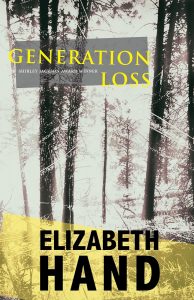There’s not much to like about Cass Neary, the New York photographer who anchors this intriguing, uneven, but ultimately entertaining mystery of artistic crime. If she’s awake, she’s lying. When you’re not looking, she’s stealing. Her anger is always on the prowl, seeking any whiff of a slight. She is high much of the time and when she’s not, she’s drunk. “I have,” she says, “as many words for ‘hangover’ as an Inuit has for snow.”

Cass was a star at age 20, famous for photographing the human detritus of the city’s punk era: needles in arms, semi-public sex, and young bodies, dead from ODs on the streets. Three years later, her fame is flamed out. Emotionally cauterized by a rape, doped into stagnation, she can’t make pictures anymore. And when she does try, she is told her images are both passé and overly violent.
“It’s too raw,” a gallery rep says. “It’s too much like being right inside someone’s head.”
“It is inside someone’s head,” Cass answers. “It’s the inside of my head.”
Rejected and angered, Cass retreats. Two decades later she remains sheltered — working in a bookstore stockroom, hiding out from everything but her rage – when an opportunity arrives via an old friend: a magazine assignment to interview and photograph a reclusive photographer, Aphrodite Kamestros, who published two books of dark, haunting images and then disappeared to an island off the coast of Maine. Cass is reluctant, but takes the job because Aphrodite’s work was a guiding spirit of Cass’s own.
From this point on Cass steps through the looking glass into a world where nothing is what, or who, it seems to be. Contrary to the Maine farmer’s oft-quoted quip, “you can’t get there from here,” in Cass’s version of Maine you can definitely get there, but you probably shouldn’t go.
Heavy with colorful dialog, the story sprints through an obstacle course of missing persons, aging hippies, clannish townsfolk, and artists in the clutch of malevolent muses. With a few exceptions, it’s all fun stuff.
“Generation Loss” has pretensions of being more than just a mystery – and it fulfills some of them when it describes the magic of seeing and making photographs (especially with film) – but it works just fine as a somewhat edgy, somewhat quirky whodunit.
